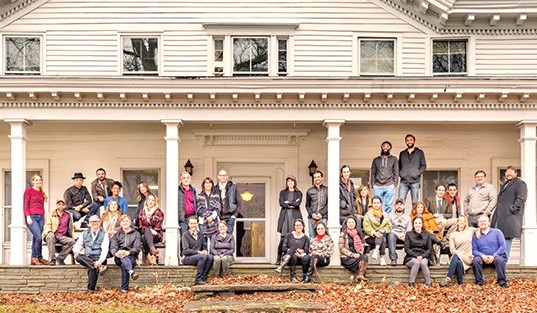Etsy founders Matt Stinchcomb and Rob Kalin have certainly enjoyed quite the ride over the last decade. Their the mission-driven craft marketplace, Etsy, was created in 2005 to provide home “makers” with broad consumer connectivity while still maintaining individual voice. Yet Stinchcomb is far from resting on his laurels; he’s now sinking energy into an idea that is creating a boon for the Hudson Valley. As Executive Director for The Good Work Institute — officially an offshoot of Etsy — Stinchcomb is creating a community-based economy that moves beyond profit and into purpose-driven entrepreneurship.
“What we provide to the fellows is some clarity around who they are, what their unique gifts are, and how they might actually contribute to the regeneration of their communities and their lives,” Stinchcomb explains.
The Hudson Valley 2016 Fellowship wrapped up this December, and consisted of local entrepreneurs and community leaders. The 35 members varied from farmers to lawyers to musicians, across both profit and nonprofit groups. Sessions weren’t confined to hotel conference rooms or Powerpoint presentations. Participants made a meal together during one session. Patagonia’s Director of Philosophy, Vincent Stanley, spoke to the cohort about business decisions driven by ideals, not the bottom line. They visited the Nature Institute in Ghent, discussing sustainability and the importance of preserving place. They dug in the dirt.
The Good Work Institute has attracted mentors like Michelle Hughes, the director of investments and partnerships at the National Young Farmers Coalition, a nonprofit that represents young farmers, sustainability in agriculture, and advocating for fair labor and inclusion of diversity in farming. Hughes heard about the Institute fellowship from Managing Director Erica Dorn, whom she worked with on a project representing immigrant farmers.
“It’s sort of been a mix of concrete tools, really inspirational speakers, and also a lot of personal growth,” Hughes says.
Gregg Osofsky from the Watershed Center, a nonprofit social justice retreat center in Millerton, learned of the fellowship through an associate at Hudson River Housing in Poughkeepsie.
“What I think Good Work has recognized, and is trying to connect with, is what are the real bottom lines that we are interested in as people engaged in our communities,” Osofsky says, “And that extends beyond profit. Good Work is trying to figure out how you actively bring forward the other bottom lines — around equity, environmental stewardship, and justice.”
Philippe Pierre is an altogether different character. He runs Palate Wines and Spirits as well as Ms. Fairfax, a restaurant in Newburgh, N.Y. The experience opened his mind to possibilities that he hadn’t really considered. Pierre pointed to a recent lecture by Steffen Schneider from Hawthorne Valley Farms, who introduced the concept of “How much is enough?”
“In my business experience, there wasn’t this notion of a satiation point,” Pierre says. “Good Work Institute challenged that idea.”
As for the difference between this business workshop model and other more traditional networking events, Pierre says that the Good Work Institute led to lasting and worthwhile connections.
“Networking events tend to be about hobnobbing, about posturing, making very superficial, self-interested opportunistic relationships. I’ve never gone to a one where someone would later become a friend,” Pierre says with a laugh. “This is inspiring. You don’t normally come back from a housing networking event inspired.”
Fellows in the program are required to create a Good Work Commitments + Plan, applying what they have learned. Pierre, for his part, explains that for his “paradigm shift,” he will now take a more personal approach in viewing his staff and customers. “It’s not necessarily seeing people that walk in as plus-dollar signs, and people working behind the counter as minus-dollar signs,” he says, “That’s not who they actually are.”
The Good Work Institute is now signing up interested parties for spring 2017, which will run through June. A call for applications for the fall 2017 cohort will be announced in the spring.
THIS ARTICLE is an excerpt from a January 2017 feature in Chronogram magazine, written by Hannah Phillips. Chronogram is a Luminary Media publication, based in Kingston, N.Y.
Originally published at medium.com


